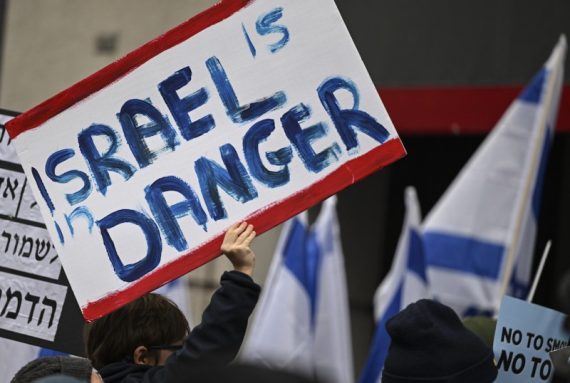W
hile people across the world cannot remain silent about the ongoing massacre of Palestinians in Gaza and are organizing protests against Israel, calls for a boycott of Israeli goods are being heard from many locations. Many are asking, “Will this boycott be useful?” Yes, it will be useful and it will undoubtedly be much more useful than expected.
For decades, blood and tears have been flowing in Palestine, where probably the most brutal massacre and genocide in the history of mankind has been taking place. Even during the temporary ceasefire declared for the exchange of prisoners, Israel continued to massacre women and children at every opportunity. Although the Israeli lobby, which is very strong in the economic, political, cultural and artistic fields, is doing its best to silence the voices calling for a boycott, the reaction against Israel has long gone beyond submission to pressure.
The beginning of the state of Israel
Palestine was conquered by Sultan Selim I in 1517 and remained under Ottoman rule for about 400 years until the British Mandate in 1917. The Ottoman Empire was a guarantor of prosperity and stability in the region, and when it weakened and withdrew from these lands, life for the people in the region became harder. The land of Palestine became the target of those who embraced the Zionist idea, which was first introduced by Theodor Herzl in 1896.
Palestine, which the Jews claimed as their ancestral land, was occupied in a planned and gradual manner with the migratory movements called “Aliyah.” Despite all the measures and preventive efforts taken by the Ottoman Empire, according to various sources, around 50,000 Jews immigrated to Palestine. This planned attempt at occupation gained momentum after 1917, but at that point not enough people had migrated to establish an independent state in the region.
The most important milestone in the process leading to the establishment of the state of Israel was the letter sent by then British foreign secretary Arthur James Balfour to Lord Jacob Rothschild, one of the leading financiers and supporters of the Zionist movement, on November 2, 1917, known as the “Balfour Declaration.” Therein Britain’s support for the idea of a homeland for the Jews in Palestine was put forth. However, the establishment of an Israeli state in Palestine still needed a catalyst and that opportunity came with World War II.
From an oppressed nation to a cruel state
World War II, which began in 1939 with the invasion of Poland by Nazi Germany, should be considered one of the most important events that affected the fate of Palestine.
According to certain sources, six million Jews were murdered in World War II. The bodies of those who died as a result of starvation, torture, harsh working conditions, and criminal medical experiments were burned in ovens in Nazi concentration camps, the largest of which was in Auschwitz, Poland. When the war ended, the massacres committed by the Nazis were recognized by the United Nations as the genocide of European Jews, also known as the Holocaust. Hundreds of films, books, and events on the Holocaust have led to worldwide sympathy for the Jews, who are portrayed as an oppressed nation, and the idea that this oppressed nation should have a safe homeland where they can live together to prevent such persecution in the future became stronger and stronger. The motto of the state of Israel, which was established in Palestine, is, in fact, “Never again.”
In the aftermath of World War II, immigration from all over the world, especially Europe, to what is now Israel, which is actually Palestinian territory, accelerated. While the number of Jewish settlers in Palestine increased day by day, Zionism began to gain more supporters, thanks to the overt and subliminal propaganda carried out mainly by Hollywood and the U.S. Thus, the Jews in Israel accelerated the process of armament and the creation of armed organizations against the Arab population, and in 1948, the fuse for today’s tragedies was lit. As a result, in 1948, the state of Israel was established, which the Palestinians called “Nakba” (“The Catastrophe”), and Palestinians began to be deported on a massive scale.
The children of the Jewish refugees, who expected mercy and tolerance when they wrote “The Germans destroyed our families and homes, don’t you destroy our hopes” on a banner on a refugee ship that carried them to Palestine in 1947, are now destroying the families and homes of Palestinians.
Social and diplomatic efforts against oppression
While a great cruelty is taking place in Palestine, which has been called the world’s largest open-air prison, people from all over the world are trying their best to put an end to the humanitarian catastrophe. If we want to give praise where praise is due, undoubtedly, President Recep Tayyip Erdoğan is the head of state who has made the most effort in this regard.
In his diplomatic meetings, President Erdoğan is among the loudest voices of the oppressed Palestinian people and these efforts are highly appreciated all over the world—but not so in domestic politics where they are presented as a futile effort.
The result of solidarity: Boycott of Israeli goods
Demonstrations against Israeli state terrorism are taking place in different parts of the world. People see the boycott of Israeli products as their strongest trump card against the atrocities in question. Are these protests and boycotts a futile effort, as the black propaganda of some circles suggests? Absolutely not. In fact, we are already beginning to see the economic, diplomatic, and psychological results of these efforts.
Israel will suffer serious economic damage as a result of the boycotts. In an open letter to Prime Minister Benjamin Netanyahu and Finance Minister Bezalel Smotrich, a group of 300 Israeli economists pointed out the gravity of the situation, by saying, “You do not understand the magnitude of the economic crisis facing the Israeli economy.” The economists predict that the boycott will go far beyond simply not buying certain goods.
The second and most important stage of the boycott is to eliminate dependence in all sectors, especially the economy and finance, by producing products equivalent of those of Israeli companies. The best example of this is a financial payment system: now, expenditure which used to be made using Israeli-owned Visa and MasterCard will be made using TROY, a local and national system in Turkey. As the number and areas of use of these and similar national products increase, the hegemony of Jewish capital in the world will be dealt a serious blow. This is the reality that makes Israeli economists lose sleep.
Recommended
A cumulative loss of about $15 billion in Israel’s GDP
According to a 2015 report by the U.S.-based Rand Corporation, the boycott of the Israeli economy in 2013 and 2014 caused a cumulative loss of about $15 billion in Israel’s GDP over ten years. This resulted in a 3.4% decline in Israel’s GDP per capita. The current boycott will cause much greater damage to the Israeli economy because it is much more widespread. Considering that every dollar that does not enter the Israeli state budget cannot be used to purchase weapons and ammunition, it is clear that participating in the boycott is not only a conscientious but also a humanitarian obligation.
Regarding the psychological dimension of the boycott, it is important to stress that it is not easy to give up one’s consumer habits as it requires an active change of mentality. In addition, by boycotting companies that support Israel, a person accepts that Israeli cruelly kills innocent people and declares to the world that they are against Israel. People thus cease to be passive agents and become active subjects. If a person does nothing in the face of suffering, they will be driven to “despair and hopelessness”—as the Jewish lobbies want. Boycotting helps people overcome the feeling of helplessness by allowing them to actively do something.
If we look at the diplomatic results of the boycott and the protests against Israeli terrorism, some countries have either completely broken off their diplomatic relations with Israel or reduced them to the lowest level, thus isolating the country and its supporters in the international arena, and putting them under great pressure.
It is useful to recall the parable about the young man and the starfish. A man walking on the beach at low tide saw a young man throwing starfish back into the sea that had washed up on the shore. He said to him, “There are thousands of starfish washing up on the beach!” implying that his effort was futile. “Since you can’t throw them all back into the sea, what difference will it make?” he asked. Throwing a starfish back into the sea, the young man said, “It made a difference to that one.”






